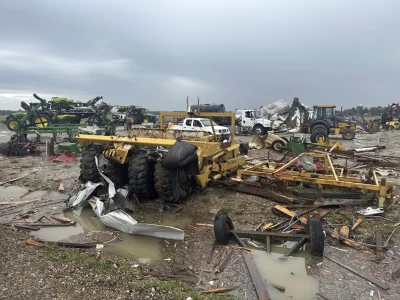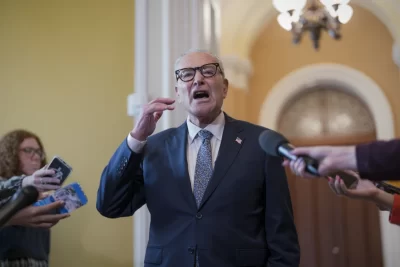
The head of the United Nations warned Wednesday that the “gates of hell” are at hand as climate change intensifies, and top international officials said the world’s leaders still aren’t doing nearly enough to curb pollution of heat-trapping gases. They pleaded with major emitting nations to do more.
Those nations remained silent. They weren’t allowed to speak because, organizers said, they had no new actions to take.
The only countries that touted their efforts — “first movers and doers,” the United Nations called them — were responsible for just one-ninth of the world’s annual carbon pollution.
“Humanity has opened the gates of hell,” U.N. Secretary-General António Guterres said Wednesday, opening a special climate ambition summit with yet another plea for action. “ Horrendous heat is having horrendous effects. Distraught farmers watching crops carried away by floods. Sweltering temperatures spawning disease. And thousands fleeing in fear as historic fires rage.”
Guterres convened the summit with the idea that only world leaders who came with new concrete actions would get to address their peers on the issue. But leaders of the countries that produce the most heat-trapping gases themselves chose not to even ask.
The 32 national leaders who did qualify represent only 11% of the world’s carbon dioxide pollution. China and the United States both emit more carbon dioxide than those 32 countries combined. The European Commission’s president was also permitted to speak.
“We are in the final stages of what actions are needed to preserve this planet and regrettably I’m not sure everybody is getting it,” said Barbados Prime Minister Mia Mottley, who called on debt pauses and cancellations and changes in multinational development banks and the insurance industry.
Mottley, a leader of poorer nations struck frequently by extreme weather, lamented that everybody was paying attention to Ukrainian President Volodymyr Zelenskyy who was speaking at the same time at the Security Council. While she stands in support of Ukraine, she said, climate change is “a greater threat because more lives are at stake globally than they are in Ukraine.”
EXTRA EFFORTS CALLED FOR
Even though the world in 2015 adopted a goal of limiting warming to 1.5 degrees Celsius (2.7 degrees Fahrenheit) since pre-industrial times, instead Earth is on a path to warming 2.8 degrees Celsius (5 degrees Fahrenheit) — “a dangerous and unstable world,” Guterres warned. The world has already warmed at least 1.1 degrees Celsius (2 degrees Fahrenheit) since the middle of the 19th century.
“But the future is not fixed. It is for leaders like you to write it,” Guterres said.
Guterres called on “major emitters — who have benefitted most from fossil fuels — to make extra efforts to cut emissions, and on wealthy countries to support emerging economies to do so.” They were silent.
“There’s no doubt that the absence of so many leaders from the world’s biggest economies and emitters will clearly have an impact on the outcomes of the summit and diminish the contribution that many of us had hoped it could make,” said longtime climate negotiations analyst Alden Meyer of the European think-tank 3EG.
On the same day Guterres called for more and faster cuts in heat-trapping emissions and in spending helping poor countries shift to renewable energy and adapt to a warmer world, British Prime Minister Rishi Sunak appeared poised to slow down his country’s efforts — and go in the opposite direction.
In contrast, European Commission President Ursula von der Leyen crowed about how their members pledged to reduce carbon pollution 55% by 2030 and is doing even better than that.
Guterres, a new special U.N. report on the lack of progress in the fight against climate change, activists and some scientists have called for a phase-out of fossil fuels coal, oil and natural gas. But international negotiations keep away from adopting such a big move.







